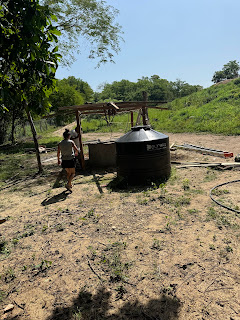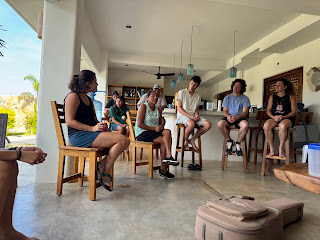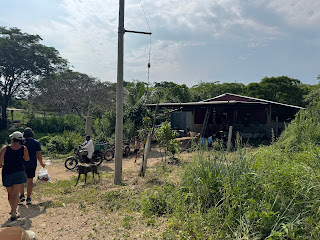 |
| Pictured: Isaak, Skyler, Brendan, and Trevor |
I’m a lifelong Cleveland sports fan. I remember watching the Indians and Browns at the old Municipal Stadium and the Cavs at the Richfield Coliseum. I ushered at Jacob’s Field the night the Indians clinched the division in 1995. I “witnessed” LeBron’s playoff runs and celebrated when the Cavs brought the championship home in 2016. I was in the stands the night Baker Mayfield made his debut. Cleveland sports moments have shaped so many memories for me—and I’ve always wanted our teams to succeed. But this year, I want it even more.
On August 22, the Guardians were just one game over .500, sitting 10.5 games behind Detroit. Playoffs felt out of reach, and honestly, I was losing interest. That same day, though, something happened that put baseball in perspective.
Four friends—Trevor, Brendan, Isaak, and Skyler—took a road trip to watch the game they love in a new stadium. Just weeks after graduating high school, their summer adventure turned tragic when a semi-truck struck their vehicle. In an instant, life changed forever.
Two of the boys, Isaak and Skyler, had grown up in my church and had recently joined us on a mission trip to Mexico. I still remember their hard work, kindness, and joy as they laid the foundation for an orphanage. Strong, vibrant, young men full of life, love for Jesus, and a desire to care for others. And then came the phone call: their mom, Abby, in tears, not knowing the condition of her sons—only that they were in different hospitals. Worry and fear welled up in my heart while I tried to maintain a steady voice to provide comfort to their mom. Together, we prayed desperately for their lives, for healing, and for God’s comfort.
In the hours and days that followed, reports trickled in. Isaak and Trevor were released quickly. Brendan spent a couple of days hospitalized before returning home. But Skyler faced the most serious injuries—broken bones, internal trauma, and bleeding in his brain. He was sedated, and the long, fearful wait began. Each day, updates gave us reason to hope, and I joined countless others praying and following his progress. You can read about his journey HERE.
So what does this have to do with the Guardians? The boys are devoted fans. As Skyler regained consciousness, his parents turned on Guardians games in his hospital room. He fixed his eyes on the screen, responding with expressions. Then, on September 2, something remarkable happened. His mom posted:
“We've been sitting watching the Guardians game with Skyler. The nurse asked Skyler if he was in any pain, and Skyler said, "The Guardians are losing!" (Hoarse, but very clear!)
What?!?!? Miracle!!
Of course, this is the first full communication he says! We are still in disbelief! I don't
know what this means as far as what more communication will come, but he knows what's
going on!”
Can you believe that? Not a word about his physical pain, but about the Guardians losing! It was so Skyler—letting his love for baseball overshadow his own suffering. And it was a miracle, a breakthrough moment that filled us with hope.
Since then, Skyler has continued to heal. He’s now back in Akron, close to returning home. And as his health improved, so did the Guardians’ fortunes. Since September 2, the team has gone 18–6, including a run of winning 17 of 19 games—erasing a 10.5 game deficit to take first place in the division.
I don’t believe God is concerned with the outcome of baseball games. But I do believe He provides reminders of hope in the small things. For Skyler, for his friends, for all of us watching—Guardians wins have been a source of encouragement and joy.
That’s why I want the Guardians to keep winning this year. Not just for standings or stats, but because their story is intertwined with the story of four young men who remind us to keep fighting, keep believing, and never give up. Baseball may be small in light of eternity, but it can still be a gift of joy in the middle of hardship.























 Emmay finished her mural!
Emmay finished her mural! 





























